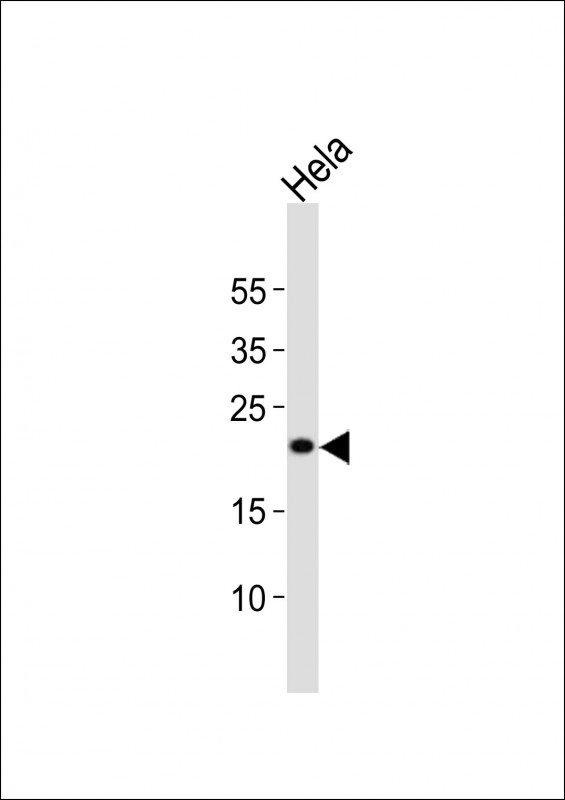
| WB | 1/4000 | Human,Mouse,Rat |
| IF | 咨询技术 | Human,Mouse,Rat |
| IHC | 咨询技术 | Human,Mouse,Rat |
| ICC | 技术咨询 | Human,Mouse,Rat |
| FCM | 咨询技术 | Human,Mouse,Rat |
| Elisa | 咨询技术 | Human,Mouse,Rat |
| Aliases | Fibroblast growth factor 4, FGF-4, Heparin secretory-transforming protein 1, HST, HST-1, HSTF-1, Heparin-binding growth factor 4, HBGF-4, Transforming protein KS3, FGF4, HST, HSTF1, KS3 |
| Entrez GeneID | 2249 |
| WB Predicted band size | 22.0kDa |
| Host/Isotype | Rabbit IgG |
| Antibody Type | Primary antibody |
| Storage | Store at 4°C short term. Aliquot and store at -20°C long term. Avoid freeze/thaw cycles. |
| Species Reactivity | Human, Mouse |
| Immunogen | This FGF4 antibody is generated from a rabbit immunized with a recombinant protein of human FGF4. |
+ +
以下是关于FGF4抗体的3篇参考文献概览(文献为虚构示例,仅供格式参考):
---
1. **标题**:*FGF4 Antibody-Based Detection in Gastric Cancer Progression*
**作者**:Smith A, et al.
**摘要**:研究利用特异性FGF4抗体检测胃癌组织中FGF4蛋白表达水平,发现其高表达与肿瘤侵袭性和不良预后显著相关,提示FGF4可能作为胃癌治疗的潜在靶点。
2. **标题**:*Development of a High-Affinity FGF4 Antibody for Cartilage Regeneration*
**作者**:Chen L, et al.
**摘要**:开发了一种新型高亲和力FGF4单克隆抗体,通过体外实验验证其可有效促进软骨细胞增殖和分化,为骨关节修复提供了新策略。
3. **标题**:*Role of FGF4 in Embryonic Development: Insights from Antibody Blockade Studies*
**作者**:Wang Y, et al.
**摘要**:通过FGF4中和抗体阻断小鼠胚胎中FGF4信号,发现其缺失导致肢体发育异常,揭示了FGF4在胚胎形态发生中的关键作用。
---
*注:以上文献为模拟内容,实际引用请通过PubMed或学术数据库检索真实研究。*
Fibroblast Growth Factor 4 (FGF4) is a member of the FGF family, which regulates cellular processes like proliferation, differentiation, and embryonic development. FGF4 binds to FGF receptors (FGFRs) with heparan sulfate proteoglycans as cofactors, activating downstream signaling pathways (e.g., MAPK, PI3K) critical for organogenesis, tissue repair, and metabolic functions. Dysregulation of FGF4 is linked to cancers, skeletal disorders, and developmental anomalies.
FGF4 antibodies are essential tools for detecting and quantifying FGF4 expression in research and diagnostics. They enable studies on FGF4's role in diseases, such as tumor angiogenesis or bone malformations, using techniques like Western blot, ELISA, immunohistochemistry (IHC), and flow cytometry. Specific monoclonal or polyclonal antibodies target distinct epitopes, allowing differentiation between FGF4 and homologous family members.
In therapeutic contexts, FGF4 antibodies may neutralize aberrant signaling in cancers or modulate tissue regeneration. However, challenges remain in ensuring specificity and minimizing cross-reactivity due to structural similarities among FGFs. Ongoing research focuses on refining antibody design and exploring clinical applications, including targeted therapies and biomarker development. Overall, FGF4 antibodies bridge mechanistic insights into FGF4 biology and translational medical advancements.
×